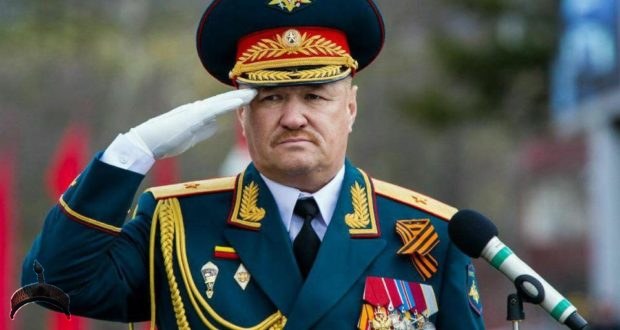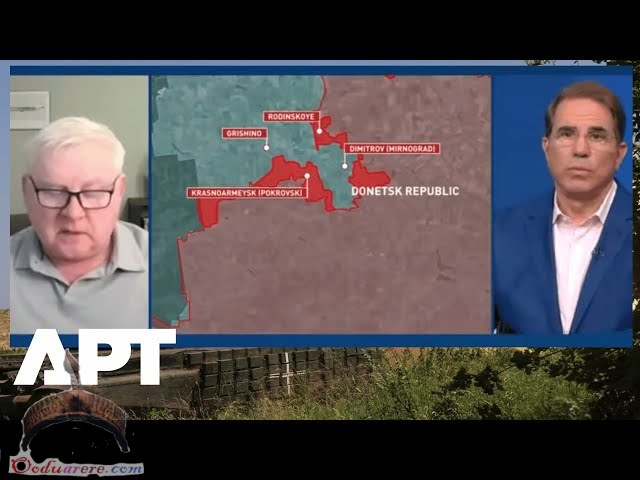The death of Lieutenant General Valery Asapov and two Russian colonels who were with him in Syria highlights the fundamentally different military command philosophies of the US and Russian militaries.
by Alexander Mercouris for Russia Feed
Unlike Western armies the Russian army still requires senior officers like General Asapov to lead their men into battle
Putting aside the question of whether or not General Asapov was deliberately targeted, the key point about his death is that he was a high ranking general (commander at the time of his death of Russia’s 5th Red Banner Army) who was killed whilst carrying out personal reconnaissance on the front line in Deir Ezzor in Syria, where he exposed himself to shelling.
Though his death was big news in Russia, it has been received there calmly, with none of the displays of dismay or panic, or the feverish post-mortems, or the angry cries for vengeance, which would assuredly have happened if a US officer of similar rank had been killed in the same way.
Nor is there the slightest sign of General Asapov’s death having caused any change in the battlefield strategy followed by the Russians in Syria.
Thus offensive military operations by the Syrian army as advised and directed by the Russians in the area where General Asapov was killed continue with undiminished vigour, with – as reported by The Duran – Russian engineers just completing a road bridge across the Euphrates to enable the Syrian army to get across.
All this highlights a key point about the Russian army’s system of command: Russian commanders – including the most senior commanders – are expected to lead from the front, making themselves visible to their men, whilst at the same through direct observation gaining a ‘feel’ for the battle.
By contrast US military practice prefers to keep commanders out of harm’s way, expecting them to control the battle from their headquarters in the rear.
The result is that Russian commanders run a far greater risk of being killed or injured than their US counterparts do.
Back in 2008 General Anatoly Khrulyov, commander of Russia’s 58th Army, was wounded during the war with Georgia during a firefight with Georgian Special Forces. Khrulyov’s wounding was reported in the West as a blow to the Russians. The Russians however were unfazed, going on to win the war against Georgia – in which General Khrulyov’s 58th Army played the leading part – in just five days.
After the war General Khrulyov continued to command the 58th Army until his retirement in 2010, when he became – with the agreement of the Russian government – the Chief of Staff of the military of the breakaway former Georgian republic of Abkhazia, which through his contribution to the battle in 2008 he had helped to save.
By contrast when US Major General Harold Greene was killed in Afghanistan in 2014 as a result of an insider attack by an Afghan soldier, it was the first time a US general had been killed in combat for more than forty years. To see what an unusual occurrence that was, consider how the BBC reported General Greene’s death
Gen Greene is not only the highest ranking US military official to have been killed since the start of the war in Afghanistan, his death also marks the first time in more than 40 years that a general has been killed in combat….
“It was once common for generals to share the fate of the ordinary soldier,” says Boston University political scientist Andrew Bacevich. “There was once a common used phrase – ‘fighting generals’ – those who stayed on the front lines.”
Lt Gen Simon Bolivar Buckner Jr was killed in the final days of the Battle for Okinawa during World War Two. Posthumously promoted to the rank of four-star general, Gen Buckner became the highest-ranking military officer killed on the battlefield during that war.
“In the US Civil War, it was quite common for generals to be killed. In World War Two, the odds were substantially lower,” says Stephen Biddle, a military expert with the Council on Foreign Relations.
“As weapons’ ranges increased, the headquarters tended to move to the rear, to get them further out of harm’s way.”
Maj Gen John Albert B Dillard Jr was killed during the Vietnam War when his helicopter was shot down in 1970. According to data compiled by the Associated Press, Gen Dillard was the last army general killed in action overseas before the death of Gen Greene.
As military technology and tactics changed in Vietnam, so did the nature of the war. Because of the lack of distinct frontlines, many commanders would lead their battalions from helicopters above the battlefield, radioing commands to their soldiers below…..
Lt Gen Timothy Maude became the highest-ranking officer killed by foreign action since Gen Buckner when a passenger plane crashed into the Pentagon on 9/11.
Following the Vietnam War, high ranking officers were rarely placed in vulnerable positions, such as on the battlefield. Instead, they occupied more strategic positions in places like the Pentagon.
“In modern times, the American military has become more bureaucratised,” says HW Brands, a historian at the University of Texas.
“These days it takes a long time to become a general – 25 years – whereas in the Civil War, people became generals after three months in battle. The army will not put someone with 25 years training on the field.”
Note that this very low level of combat deaths of US generals – Dillard and Greene are the only two to have been killed in combat since 1970 – has happened notwithstanding that the US military has been engaged in fighting in one place or another almost continuously since that year.
This is completely different from Russian military practice, in which the commander is expected – including by his own soldiers – to lead from the front, something which inevitably exposes senior Russian officers to much greater risk of death or injury in battle by comparison with senior US officers.
The reason the Russian military is able to brush off losses of its senior commanders such as those of Generals Khrulyov and Asapov in a way that the US military almost certainly would not be able to do is because the command and staff systems of the Russian army are specifically designed in anticipation of such losses.
This has practical consequences in the way US and Russian officers conceive of their command roles during a battle.
A US commander directs the battle from his headquarters in the rear, relying on reports and intelligence (including increasingly from drones) to keep him accurately informed about what is going on. By way of example, in 2003 General Tommy Franks directed the whole invasion of Iraq from his headquarters located far away to the rear in Qatar.
By contrast a Russian commander is supposed to lead from the front. General Khrulyov was wounded in 2008 because he advanced with his men into South Ossetia, and General Asapov has just been killed because he was carrying out personal reconnaissance on the front line in Deir Ezzor in Syria.
Reports and intelligence from drones and from other technical means obviously are sent to Russian headquarters, just as they are to US headquarters, and are processed by the staff there and provided to the commander and to the supreme headquarters in Moscow. However the burden of assessing this intelligence and these reports, and informing and advising the commander about them, falls upon the chief of staff, whose role in the Russian army goes far beyond the organisational and planning tasks the chief of staff tends to have in the US army.
Which is the better system as a civilian I am in no position to judge.
The Russians would doubtless say that the US system turns commanders from warriors into managers, robbing them of their ‘feel’ of the battle, and causing them to lose the qualities of aggression and inventiveness which are essential to achieve victory.
The Americans would doubtless respond that the Russian system is outdated, being more suited to the Napoleonic battlefield than the modern battlefield, and that sending valuable officers into harm’s way where they might get injured or killed is not only wasteful, but by distancing the officers from their headquarters, actually limits their knowledge of the state of the battle.
Regardless of who is right, on the specific subject of General Asapov’s death, I suspect that as a Russian officer he would be baffled by some of the things which have been said about it.
I am sure that he would say that death is an occupational hazard for a soldier, and that there was therefore nothing untoward or remarkable about his death, and that the proper way to respond to it is not to seek ‘revenge’ – which I suspect he would consider futile and pointless – but to complete successfully the mission for which he gave his life.
As to his being ‘martyred’, I suspect that he would simply say that death in battle was the price he was always willing to pay for his service as a Russian soldier.
——-
Commentary by The Saker: having met quite a few Soviet/Russian generals myself, and coming from a family of Russian military officers, I can attest that Alexander Mercouris is stop on. Whereas in the West the death of a general is seen as some kind of failure, in the Russian military culture this is something completely expected, even if it is no less tragic and painful. The example of the first Chechen war mentioned by Mercouris is most telling. This war, which was one of the worst planned, prepared and executed war in Russian history, a war which saw many generals categorically refuse to participate in (little known fact, but absolutely true) and which saw those generals who did agree to participate in it go there with the full knowledge that they were headed for a disaster is a war which saw Russian generals not only in the frontlines, but literally in the basements of the buildings in Grozny just a few yards away from the Chechen positions!
Here is a video taken during the combats in Grozny. It shows footage taken inside the hastily arranged command post of Lieutenant-General Lev Rokhlin (a 2 star general in the US classification) – the guy on the photo on the left. Look at the conditions in which this general operated and look at the faces of the men around him. And I assure you that there is nothing that would have made these men happier than personally shooting their drunken President (Eltsin) and their imbecile Minister of Defense (Grachev). Even without understanding Russian you can see that these men all know that they can be killed at any second, yet they fight at the very frontline because they know that they cannot hide behind their soldiers.
At the time this footage was taken, hundreds of Russian soldiers had been stupidly and horribly killed and generals like Rokhlin were sent in to fix what is known in US military terminology as a clusterf**k. Lieutenant-General, Valery Asapov, the general who has just been killed in Syria, was also there, also at the front line. He got wounded and suffered from his wounds for the rest of his life.
See this short video for yourself and try to gage the “atmosphere” of the moment. See the dirt and exhaustion of these man and try to imagine who a US general would fit into this scene:
This was filmed in Grozny, but it could have been filed in Stalingrad. Do you feel that?
This video also features interviews with various Russian officers and soldiers. Do you notice that you can hardly tell them apart, that except for their age they all seemed to be made out of the same stuff? That’s because they are.
That is how Russians fight.
US generals are primarily manicured politicians and administrators. Not soldiers. Most of them have not seen frontline combat since many, many years. In South Ossetia during the 08.08.08 war a Russian general was wounded when he was part of a recon column entering the outskirts of the city of Tskhival. Was this a “mistake”? Nope, that was normal. That is how it should be.
To my knowledge the only military in the West which used to have the same approach was the German military during WWII. German generals were also frontline soldiers and a lot of them died in combat.
Why is that so important. For a couple of reasons.
- A frontline general not only gets fancy multi-media reports, but gets a personal “feel” for the reality, the “mood” of the combat situation.
- A frontline general has a change to see the truth and bypass the attempts by his subordinates to bullshit him about the real situation.
- A frontline general shows his man that he really cares for them and that he does not put his life above theirs. That is the kind of man that can lead his soldiers even into a suicide attack if needed.
- A frontline general personally knows the horrors of war and if far less likely to support a war if it can be avoided.
- A frontline general usually despises politicians and understands that his lot, his calling, is a totally different one: his loyalty is to his men and not to some Military-Industrial Complex or various lobby groups.
Mind you, not all Russian general are such frontline generals. During the Soviet the “democratic era” there were plenty of coward generals which were despised by real soldiers. Everybody knew who they were and they had no authority in the military. But now that Russia is returning to her ancient military traditions frontline generals are, again, becoming the norm.
The death of General Asapov is a painful loss for all Russians. But it is not a mistake or something unexpected. The best men die during wars. This is also why Russians hate wars so much.
The Saker
 Ọmọ Oòduà Naija Gist | News From Nigeria | Entertainment gist Nigeria|Networking|News.. Visit for Nigeria breaking news , Nigerian Movies , Naija music , Jobs In Nigeria , Naija News , Nollywood, Gist and more
Ọmọ Oòduà Naija Gist | News From Nigeria | Entertainment gist Nigeria|Networking|News.. Visit for Nigeria breaking news , Nigerian Movies , Naija music , Jobs In Nigeria , Naija News , Nollywood, Gist and more










